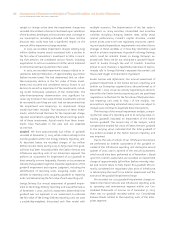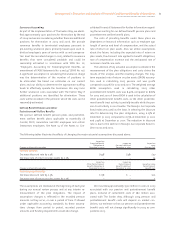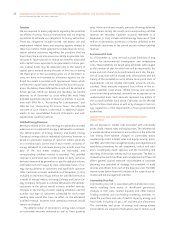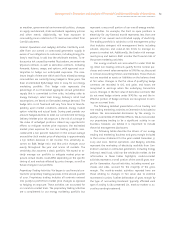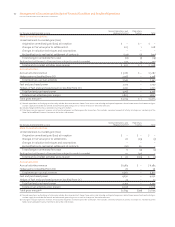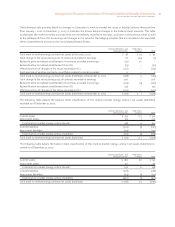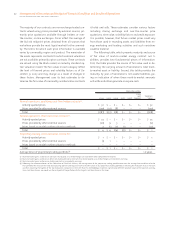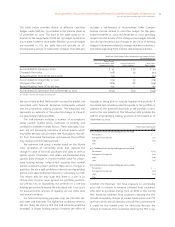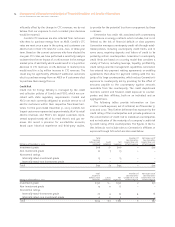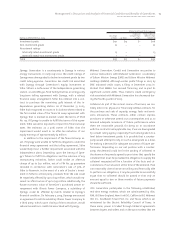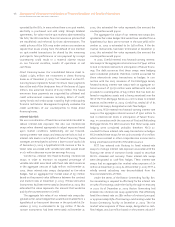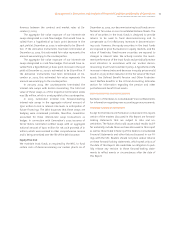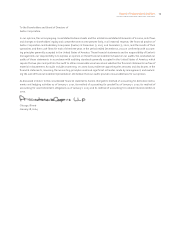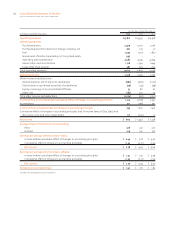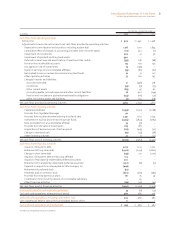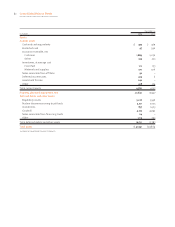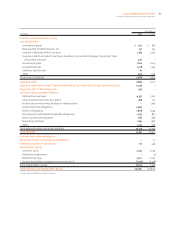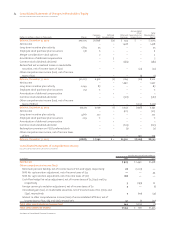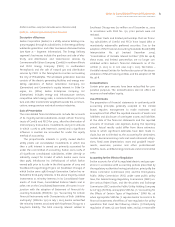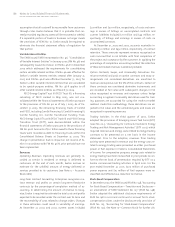ComEd 2003 Annual Report Download - page 78
Download and view the complete annual report
Please find page 78 of the 2003 ComEd annual report below. You can navigate through the pages in the report by either clicking on the pages listed below, or by using the keyword search tool below to find specific information within the annual report.76 Management’s Discussion and Analysis of Financial Condition and Results of Operations
EXELON CORPORATION AND SUBSIDIARY COMPANIES
operated by the ISOs. In areas where there is no spot market,
electricity is purchased and sold solely through bilateral
agreements. For sales into the spot markets administered by
the ISOs, the ISO maintains financial assurance policies that
are established and enforced by those administrators. The
credit policies of the ISOs may under certain circumstances
require that losses arising from the default of one member
on spot market transactions be shared by the remaining
participants. Non-performance or non-payment by a major
counterparty could result in a material adverse impact
on our financial condition, results of operations or net
cash flows.
Direct Financing Leases. Our consolidated balance sheet in-
cluded a $465 million net investment in direct financing
leases as of December 31, 2003. The investment in direct fi-
nancing leases represents future minimum lease payments
due at the end of the thirty-year lives of the leases of $1,492
million, less unearned income of $1,027 million. The future
minimum lease payments are supported by collateral and
credit enhancement measures including letters of credit,
surety bonds and credit swaps issued by high credit quality
financial institutions. Management regularly evaluates the
credit worthiness of our counterparties to these direct
financing leases.
Interest-Rate Risk
We use a combination of fixed-rate and variable-rate debt to
reduce interest-rate exposure. We also use interest-rate
swaps when deemed appropriate to adjust exposure based
upon market conditions. Additionally, we use forward-
starting interest-rate swaps and treasury rate locks to lock in
interest-rate levels in anticipation of future financing. These
strategies are employed to achieve a lower cost of capital. As
of December 31, 2003, a hypothetical 10% increase in the in-
terest rates associated with variable-rate debt would result
in a $1 million decrease in pre-tax earnings for 2004.
ComEd has entered into fixed-to-floating interest-rate
swaps in order to maintain its targeted percentage of
variable-rate debt associated with fixed-rate debt issuances
in the aggregate amount of $485 million. At December 31,
2003, these interest-rate swaps, designated as fair-value
hedges, had an aggregate fair market value of $33 million
based on the present value difference between the contract
and market rates at December 31, 2003. If these derivative
instruments had been terminated at December 31, 2003, this
estimated fair value represents the amount that would be
paid by the counterparties to ComEd.
The aggregate fair value of our interest-rate swaps des-
ignated as fair-value hedges that would have resulted from a
hypothetical 50 basis point decrease in the spot yield at De-
cember 31, 2003 is estimated to be $39 million. If the de-
rivative instruments had been terminated at December 31,
2003, this estimated fair value represents the amount the
counterparties would pay us.
The aggregate fair value of our interest-rate swaps des-
ignated as fair-value hedges that would have resulted from a
hypothetical 50 basis point increase in the spot yield at De-
cember 31, 2003 is estimated to be $28 million. If the de-
rivative instruments had been terminated at December 31,
2003, this estimated fair value represents the amount the
counterparties would pay us.
In 2003, ComEd entered into forward-starting interest-
rate swaps in the aggregate notional amount of $440 million
to lock in interest-rate levels in anticipation of future financ-
ings. The debt issuances that these swaps were hedging
were considered probable; therefore, ComEd accounted for
these interest-rate swap transactions as hedges. In con-
nection with the 2003 issuances of First Mortgage Bonds,
forward-starting interest-rate swaps with an aggregate no-
tional amount of $1,070 million were settled with net cash
proceeds to counterparties of $45 million that has been de-
ferred in regulatory assets and is being amortized over the
life of the First Mortgage Bonds as a net increase to interest
expense. At December 31, 2003, ComEd has settled all of its
interest-rate swaps, designated as cash-flow hedges.
In 2003, PECO entered into forward-starting interest-rate
swaps in the aggregate notional amount of $360 million to
lock in interest-rate levels in anticipation of future financ-
ings, in connection with the issuance of First and Refunding
Mortgage Bonds. The debt issuances that these swaps were
hedging were considered probable; therefore, PECO ac-
counted for these interest-rate swap transactions as hedges.
PECO settled these swaps for net cash proceeds of $1 million,
which was recorded in other comprehensive income and is
being amortized over the life of the debt issuance.
PETT has entered into floating to fixed interest-rate
swaps to manage interest rate exposure associated with the
floating rate series of transition bonds issued to securitize
PECO’s stranded cost recovery. These interest-rate swaps
were designated as cash-flow hedges. These interest-rate
swaps had an aggregate fair market value exposure of $11
million at December 31, 2003. As of December 31, 2003 PETT, a
wholly owned subsidiary, was deconsolidated from the
financial statements of PECO.
Under the terms of the Boston Generating Facility, Bos-
ton Generating is required to effectively fix the interest rate
on 50% of borrowings under the facility through its maturity
in 2007. As of December 31, 2003, Boston Generating had
entered into interest-rate swap agreements that effectively
fixed the interest-rate on $861 million of notional principal,
or approximately 83% of borrowings outstanding under the
Boston Generating Facility at December 31, 2003. The fair
market value exposure of these swaps, designated as cash-
flow hedges, was $77 million based on the present value dif-


